Why is it safer to drive on winter tires in Saskatchewan?

In Saskatchewan, the winter season brings with it extreme weather conditions. Wind, snow and icy roads are a part of everyday life in winter. Winter tires with a mountain or snowflake symbol on the sidewall are the safest option for winter driving.
For many reasons, winter tires are an essential item to have on your car or truck in Saskatchewan.
Like the Saskatchewan Insurance Corporation (SIC), the experts at PMCtire urge Saskatchewan motorists to choose tires that are appropriate for each season and region of the province.
It is best to drive on summer tires during the summer months and winter tires when the temperature drops below 7°C. This ensures maximum safety for the vehicle's occupants.
All-season tires cannot provide optimal performance in all weather conditions.
From November to March, you may be driving your car in winter weather conditions, which is at least 5 months of the year in Saskatchewan. Still, there are no mandatory winter tire regulations in Saskatchewan.
The real benefits of having winter tires in Saskatchewan
Winter tires are designed specifically for use during winter and have soft tread compounds that remain flexible even at temperatures that drop significantly below -40°C.
At 7°C or below, the traction ability of winter tires provides better control on cold weather roads and significantly reduced braking distances, whether the road is dry or covered with ice, snow or slush.
Winter tires are built differently. Their grooves and siping are specifically designed to evacuate snow, water, and slush.
Winter travel between Regina and Saskatoon or Alberta can be hazardous. In winter road conditions, winter tires are designed to provide superior control and traction to summer and all-season tires.
The rubber in these tires is softer and maintains an optimal level of flexibility in temperatures as low as -40°C. Winter tires are designed for cold weather and can help improve traction and control on slippery surfaces like ice and snow. They also have better tread than summer tires which allows them last longer in cold conditions.
How long will my winter tires be safe?
In addition to tread wear, age can affect the level of traction a tire provides. Over time, the rubber in tires hardens and dries out, causing cracks that may indicate that the tire is nearing the end of its life. Typically, a tire over 5 years old begins to lose its qualities.
It is vital to adapt your driving to winter conditions
In winter, driving more slowly and keeping a safe distance between your car and others is imperative. Even if there isn't much snow, winter temperatures often drop below 7℃.
And that's exactly when it's important to have winter tires on your vehicle because the performance of your tires is directly affected by the temperature.
Below 7℃, all-season and summer tires become stiffer, as they are unsuitable for such temperatures. This stiffness causes them to lose traction and reduce their braking performance, which can put your life at risk.
Winter tires have a soft tread and a tread pattern designed to work in cold weather. They offer optimal traction and reduced braking distance. They are much safer than all-season tires when driving in snow and even on ice.
Statistics show that braking performance is up to 62% better for vehicles equipped with winter tires than those equipped with all-season tires.
5 safety tips for winter driving
The safest strategy - avoid driving in bad weather!
- Choose winter tires that are appropriate for your vehicle and driving style
- Remove all snow from your car and clear all windows of ice and fog before driving.
- Increase the distance between your vehicle and the one in front of you.
- Check road conditions and plan your trip accordingly.
- Keep a charged cell phone in your vehicle.
What if I decide to keep my winter tires on during the summer?
There is nothing to stop you from doing so. However, you will have to replace them much more often, as the life of winter tires in the summer will be much shorter. More importantly, they are not designed for the warm weather of August, so they lose a lot of traction and wear out prematurely.
While many factors influence the life of winter tires, don't forget that you also play an essential role in their longevity!


